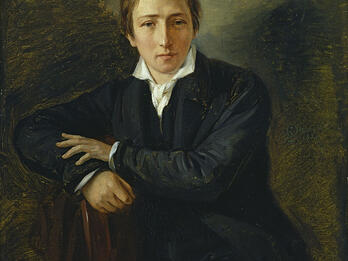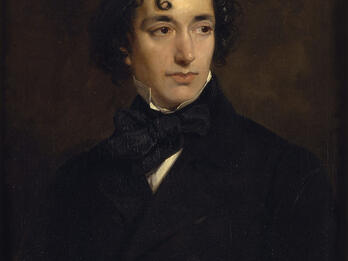Vivian Grey
Book the First
Chap. I. The Consultation
I am not aware that the infancy of Vivian Grey was distinguished by any extraordinary incident. The solicitude of the most affectionate of mothers, and the care of the most attentive of nurses, did their best to injure an excellent constitution. But Vivian was an only child, and these exertions were therefore excusable. For the first five years of his life, Master Vivian, with his curly locks and his fancy dress, was the pride of his own, and the envy of all neighbouring establishments; but, in process of time, the horrible spirit of boyism began to develope itself, and Vivian not only would brush his hair “strait,” and rebel against his nurse, but actually insisted upon being—breeched! At this crisis it was discovered that he had been spoiled, and it was determined that he should be sent to school. Mr. Grey observed, also, that the child was nearly ten years old, and did not know his alphabet, and Mrs. Grey remarked, that he was getting very ugly. The fate of Vivian was decided.
“I am told, my dear,” observed Mrs. Grey, one day after dinner to her husband, “I am told, my dear, that Dr. Flummery’s would do very well for Vivian. Nothing can exceed the attention which is paid to the pupils. There are sixteen young ladies, all the daughters of clergymen, merely to attend to the morals and the linen—terms very moderate—100 guineas per annum, for all under six years of age, and few extras, only for fencing, pure milk, and the guitar. Mrs. Metcalfe has both her boys there, and she says their progress is astonishing. Percy Metcalfe, she assures me, was quite as backward as Vivian. Ah! indeed, much backwarder; and so was Dudley Metcalfe, who was taught at home on the new system, by a pictorial alphabet, and who persisted to the last, notwithstanding all the exertions of Miss Barnett, in spelling A-P-E—monkey, merely because over the word, there was a monster munching an apple.”
“And, quite right in the child, my dear—Pictorial alphabet!—pictorial fool’s head!”
“But what do you say to Flummery’s, Grey?”
“My dear, do what you like. I never trouble myself, you know, about these matters”; and Mr. Grey refreshed himself, after this domestic attack, with a glass of claret.
Mr. Grey was a gentleman who had succeeded, when the heat of youth was over, to the enjoyment of a life-interest in an estate of about £2000 per annum. He was a man of distinguished literary abilities, and he had hailed with no slight pleasure, his succession to a fortune, which, though limited in its duration, was still a very great thing for a young littérateur about town; not only with no profession, but with a mind utterly unfitted for every species of business. Grey, to the astonishment of his former friends, the wits, made an excellent domestic match; and, leaving the whole management of his household to his lady, felt himself as independent in his magnificent library, as if he had never ceased to be that true freeman, a man of chambers.
Chapter VIII. Society
In England, personal distinction is the only passport to the society of the great. Whether this distinction arise from fortune, family, or talent, is immaterial; but certain it is, to enter into high society, a man must either have blood, a million, or a genius.
Neither the fortune nor the family of Mr. Grey entitled him to mix in any other society than that of, what is, in common parlance, termed, the middling classes, but from his distinguished literary abilities he had always found himself an honoured guest among the powerful and the great. It was for this reason that he had always been anxious that his son should be at home as little as possible; for he feared for a youth the fascination of London society. Although busied with his studies, and professing “not to visit,” Vivian could not avoid occasionally finding himself in company, in which boys should never be seen; and, what was still worse, from a certain esprit de société, an indefinable tact, with which Nature had endowed him, this boy of nineteen began to think this society very delightful. Most persons of his age would have passed through the ordeals with perfect safety: they would have entered certain rooms, at certain hours, with stiff cravats, and Nugee coats, and black velvet waistcoats; and after having annoyed all those who condescended to know of their existence, with their red hands, and their white kid gloves, they would have retired to a corner of the room, and conversationised with any stray four year oldest not yet sent to bed.
But Vivian Grey was an elegant, lively lad, with just enough of dandyism to preserve him from committing gaucheries, and with a devil of a tongue. All men, I am sure, will agree with me when I say, that the only rival to be feared by a man of spirit is—a clever boy.—What makes them so popular with the women, it is not for me to explain; however, Lady Julia Knighton, and Mrs. Frank Delmington, and half a score of dames of fashion, (and some of them very pretty!) were always patronizing our hero, who really found an evening spent in their company not altogether dull; for there is no fascination so irresistible to a boy, as the smile of a married woman. Vivian had really passed such a recluse life for the last two years and a half, that he had quite forgotten that he was once considered a very fascinating fellow; and so, determined to discover what right he ever had to such a reputation, master Vivian entered into all those amourettes in very beautiful style.
But Vivian Grey was a young and tender plant in a moral hot-house. His character was developing itself too soon. Although his evenings were now generally passed in the manner we have alluded to, this boy was, during the rest of the day, a hard and indefatigable student; and having now got though an immense series of historical reading, he had stumbled upon a branch of study certainly the most delightful in the world—but, for a boy, as certainly the most pernicious—the study of politics.
And now every thing was solved: the inexplicable longings of his soul, which had so often perplexed him, were at length explained. The want, the indefinable want; which he had so constantly experienced, was at last supplied; the grand object on which to bring the powers of his mind to bear and work was at last provided. He paced his chamber in an agitated spirit, and panted for the Senate.
It will be asked, what was the evil of all this? and the reader will, perhaps, murmur something about an honourable spirit and youthful ambition. Ah! I once thought so myself—but the evil is too apparent. The time drew nigh for Vivian to leave for Oxford—that is, for him to commence his long preparation for entering on his career in life. And now this person, who was about to be a pupil—this boy, this stripling, who was going to begin his education,—had all the feelings of a matured mind—of an experienced man; was already a cunning reader of human hearts; and felt conscious, from experience that his was a tongue which was born to guide human beings. The idea of Oxford to such an individual was an insult!
Credits
Published in: The Posen Library of Jewish Culture and Civilization, vol. 6.




